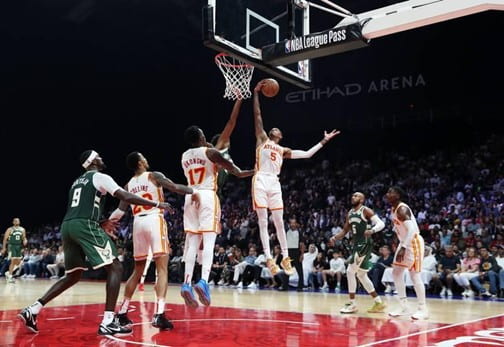
November 15, 2022
In early October, more than 18,000 cheering fans gathered in the Etihad Arena to watch the Milwaukee Bucks and Atlanta Hawks play at the NBA Abu Dhabi Games. The pre-season games, the first of its kind in the region, brought together basketball enthusiasts, residents and celebrities — mostly unmasked — in the first major public gathering after almost two years of Coivd isolation.
The event comes two weeks after the National Emergency Crisis and Disaster Management Authority of the UAE announced the end of mandatory masks. The decision is a major change in stern COIVD-19 regulations starting from early 2020 when the country recorded its first ever case. Mandatory biweekly testing to enter public spaces has also shifted to once a month. However, masks are still required in hospitals, public transport and places of worship, among others.
Prior to the change, the emirate had some of the strictest regulations in the country, such as restricting movement across its border and monitoring systems during isolation and quarantine. Indeed Abu Dhabi’s strong Coivd control also won the city the title of “World’s Most Pandemic-resilient City” for the second time by London-based Deep Knowledge Analytics as of September 2022. Some key markers of the city’s examination included the government’s response on healthcare, quarantine, vaccination, economy and more.
Despite the popular response from the public on removing masks, some residents still insist on wearing masks. “No one is sure when this pandemic will end and how this will spread again,” said Parvathi Venugopal adding, as a mom of two toddlers, “Safety is first.”
Some concerns regarding public health are spurred by the country’s peak tourism season beginning in October, with major events such as the FIFA World Cup in neighboring Qatar. More than 900,000 people from cruises alone are expected to visit the country via Dubai.
What does this mean for the public’s perceptions of health safety now?
The visiting NBA teams not only played in the Etihad arena but went sight-seeing across the city and used NYU Abu Dhabi’s gyms and courts for training and events.
Smriti Ramachandran, a sophomore at NYU Abu Dhabi, was uncomfortable with the visitors using school facilities. She continues to wear masks in crowded spaces and has been “almost habituated to the mask” since the start of the pandemic.
However, given her personal decision to keep wearing masks and the remaining Coivd restrictions in place, she feels more relaxed on potentially contracting the virus. “They [the NBA teams] probably underwent PCR testing in Abu Dhabi considering the 30-day rule,” she said.
Professor John Burt, a biology professor and head of environmental studies at NYU Abu Dhabi, recently tested positive for the Coivd-19 virus within two weeks of the mask mandate end. Describing his initial reaction to the end of the requirement as “cautiously optimistic,” he had also continued to voluntarily wear masks in high-density environments. Despite this experience he said, “I attribute this to bad luck.”
Although Prof. Burt believes dropping the mask requirement is “a pragmatic decision,” he worries there’s a potential for miscalculations on the effectiveness of the current Coivd regulations.
“It seems to me to have been short-sighted to both remove the mask mandate and shift to testing once a month,” he said. Instead, he suggests testing be conducted more frequently to allow authorities to pick up on cases caused by the removal of masks.
However, to return to normalcy, people must take into account that Coivd is here to stay, says Dr. Abdishakur Abdulle, the Associate Director of the Department of Public Health Research Center at NYU Abu Dhabi.
He explains that given the high vaccination rates (100.2% fully vaccinated as of July 2022) and efficacy of medical treatments, the country’s reached some sort of herd immunity over time. “The government approach here, as is the case in many other places, is kind of de-escalating the processes in a gradual manner,” Abdulle said.
People recognize and appreciate the safety measures too. Grace Traina, a study abroad student from New York, says this is the first time she’s been at NYU without a mask, yet she feels very safe. “I’m vaccinated and boosted so I feel pretty protected, especially since everyone on campus has to get PCR tested [monthly].”
